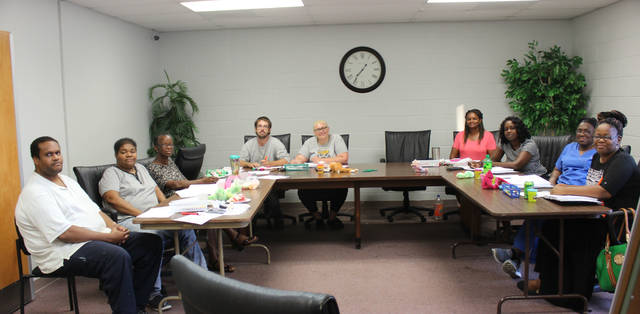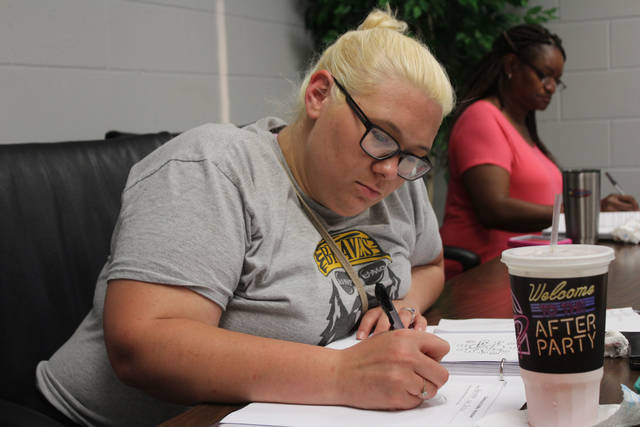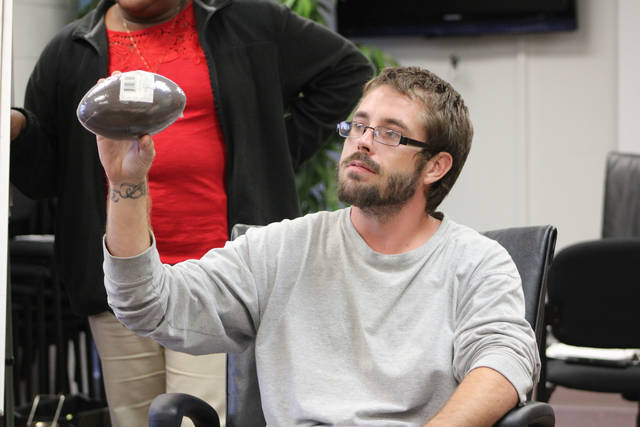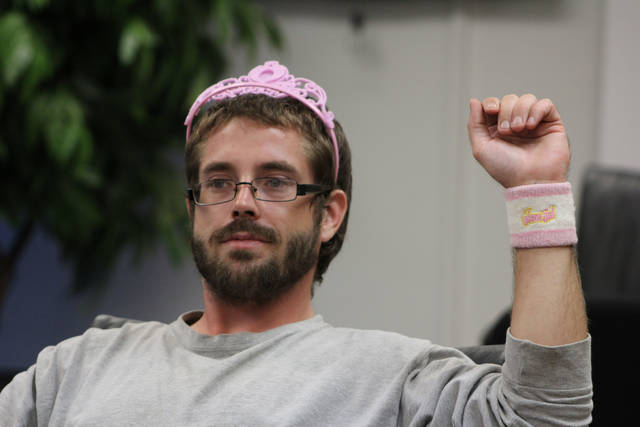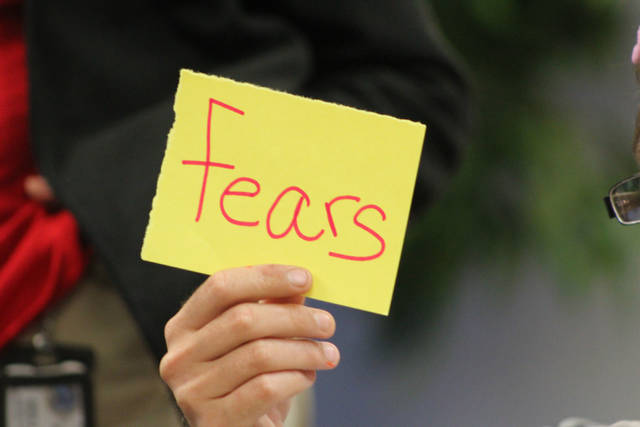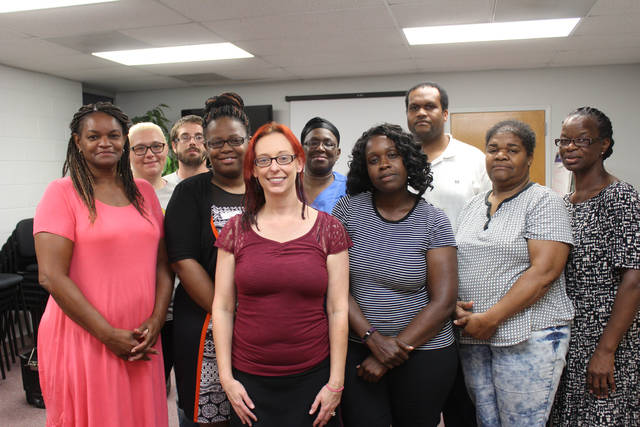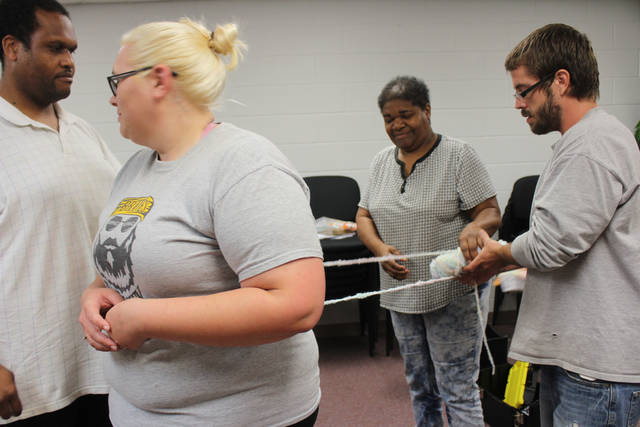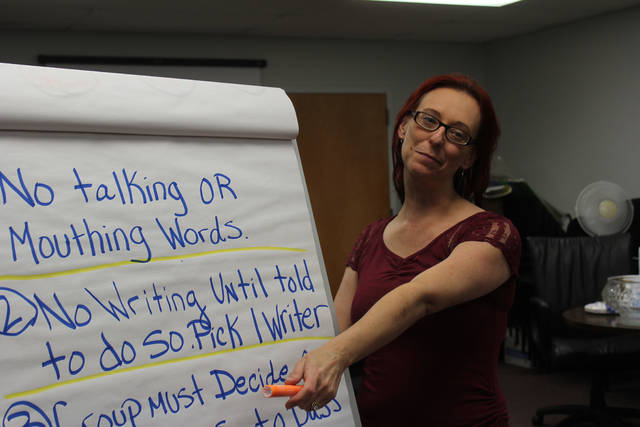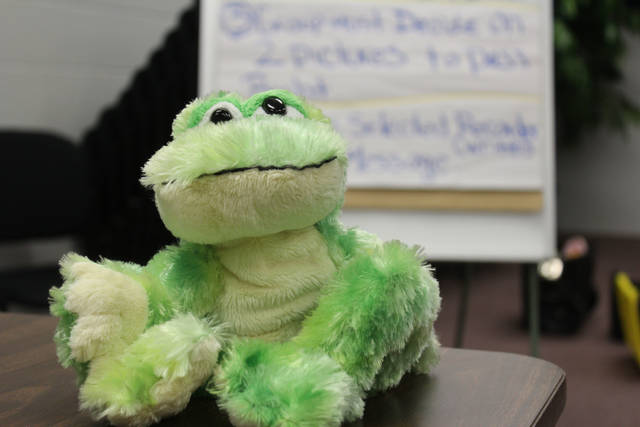ELIZABETHTOWN — Bladen County families in crisis now have more options when it comes to help.
On Thursday, the Bladen County Department of Social Services will usher in a new era when it graduats a class of foster parents ready to apply for certification through the state. The group of 12 comprised the first class to graduate through DSS in at least three years.
“We just haven’t had anybody on staff to certify people,” said class instructor LeAnne Graham. “Now that we do, we’re hoping people in Bladen County will partner with us to help families and children in need.”
The 12-session class attended by the new licensees was based on the Trauma Informed Partnering for Safety and Permanence and Model Approach to Partnerships in Parenting curricula. The focus of TIPS/MAPP is the partnership into which foster parents are moving with DSS, the caregivers of the child(ren), and other agencies like law enforcement, drug rehabilitation centers, or counseling agencies.
“We’re really moving the focus away from the foster family, DSS, and law enforcement being on one side, with the parents being alone on the other side,” Graham stressed. “Instead, we’re all partnering together to hopefully get these children back into homes with their biological families.”
The curricula covered topics like the foster care/adoption process, the losses families and children are undergoing before entering the foster system, ways to help the family and children cope with the losses, and the partnership perspective.
The latter idea is one that resonated with class member Deanna Ratliff.
“These kids love their parents, and they want to be with them,” the Clarkton resident commented. “Fostering is a bridge for parents to get themselves right so they’ll be able to get their kids back. I’m willing to do whatever is necessary to help them get themselves in the right way so the family can be back together again.”
Ratliff believes the notion of assisting parents is central to correcting a common misconception about children in foster care.
“People keep telling me the kids are bad, but they’re not bad kids — their parents made bad choices,” she commented.
The 12 graduates represented a diverse group typical of foster parents. Black and white individuals, couples and single people, a mother/adult son pair, stay-at-home folks and the employed, those with their own children and those without, and participants from their 20s to 60s comprised the class.
One theme many of them had in common, however, had to do with what brought them there. Ratliff, a single mother of two children — 18 years old and 21 years old — like many of the members of the class, decided to get involved at a critical point in her own life.
“I remember one year, my mama had just died and my two kids had went to stay with their fathers for two weeks during the summer,” she recalled. “Those were two of the hardest weeks of my life, and I cried like a pure baby. I need some energy, I need some motivation, I need some livelihood up in this house.”
If Ratliff wanted livelihood, she got at least some at the classes. Graham told participants at the outset that she “can’t stand a boring class, so we’re going to have fun.”
While some activities — like a ball-passing game about Mr. Wright and the things he left — were just for laughs, others imparted serious lessons. To teach the class members about loss, for example, Graham instructed each participant to write down five people or groups important to them. Answers ranged from “God” and “children” to “my dog” and “co-workers.” One by one, participants had to choose which relationships they would get rid of and drop the cards to the floor.
“That was really a moment for me,” said Ratliff. “It was really hard to do. These kids are being torn away from everything important to them, and they didn’t choose it.”
Ratliff and the other graduates of Bladen County’s class are opting to join a system currently under a microscope. A report submitted to the 2017 North Carolina General Assembly revealed more than 12,000 children are wards of the state, a number that reflects a 25 percent spike in the last five years.
Neither legislators nor child protection advocates have a ready answer for the cause behind the spike. While population increases could account for part of the rise, the numbers don’t support it being the sole — or even the primary — catalyst. The United State Census Bureau estimates North Carolina’s population to be growing at roughly 1 percent each year, or a 6.4 percent increase from 2010-2016 — hardly enough to justify a 25 percent increase, in about the same time frame, of children in foster care.
“Substance abuse is on the rise, and we also have mental health issues that cause neglect — those are some of our biggest issues,” Bladen County Child Protective Services Supervisor Jill Sampson said at a recent Child Abuse Awareness event.
The GA report sparked action on the part of legislators, who are attempting to provide at least some relief to the bulging foster care system. In April, House Bill 608 was introduced, with a companion bill being filed in the Senate. Entitled the Family/Child Protection & Accountability Act, its purpose is to completely restructure what, according to its sponsors, is a system with “troubling gaps and flaws … that are allowing too many … vulnerable children and fragile families to fall through the cracks.”
The Family/Child Protection & Accountability Act begins by calling for more relaxed restrictions for willing applicants. Currently, things like medication in lock boxes, cleaning products out of reach, a fire inspection, physicals for every member of the family, five references, a criminal background check for every adult, fingerprinting, a financial evaluation, 36 hours of training including CPR and first aid, multiple home visits, and mounds of paperwork probing into discipline methods and childhood homes are just some of the requirements foster parents and their biological children must meet or undergo. Lawmakers are hoping ridding the system of any unnecessary burdens will ultimately mean more families licensed to house children in the state’s care.
“The regulations are good, because they ensure we’re only getting safe, qualified homes for these children,” said Graham. “What I’d really like to see come of the legislation is a shortening of the time it takes for the application process. That would allow us to have more homes when we need them.”
The Family/Child Protection Accountability Act remains in a House subcommittee.
While relief arising from House Bill 608 is still down the road, the state’s budget, just put into effect July 6, may provide immediate help. Legislators approved $8,730,446 in recurring funds for FY 2017, another $9,146,696 for FY 2018, and $330,000 in non-recurring funds in FY 2018 for the Child Welfare Improvement Plan. Based on the Child and Family Services Review, in-home services are expanded, and a foster care and adoption parent association will be developed. To address the spike in foster numbers, lawmakers budgeted $270,903 in 2017 and $2,451,515 in 2018 in recurring funds earmarked for increased caseload management. Legislators upped by $964,878 the allocation to the Permanency Innovation Fund to be used for finding permanent homes for foster children.
In Bladen County, any additional funds would be a welcome addition.
“The foster system here is just overwhelmed,” Graham commented.
That situation was what, in part, gave rise to the class. Prior to graduating this class, according to Graham, there were 50 Bladen County children in need of foster families, and only two homes in Bladen County certified through DSS to accept the children. Caps are put on foster homes, and no home can have more than five children, including the foster parents’ biological children still living in the home.
“If we don’t have enough foster homes, we have to send them out of the county to homes certified through private organizations in New Hanover or Robeson counties,” Graham informed. “It’s very taxing on parents to have to drive there for visitation, or on DSS workers who have to make the commute for inspections. Most importantly, it’s difficult for the children. They’re so far away from everything they know. Having good, local homes for these children goes a long way to making a tough situation more bearable for them.”
For at least one graduate, the opportunity to provide that home can’t come soon enough.
“I’m ready. I’m excited,” Ratliff remarked. “I’m ready to spoil these kids and let them know they are loved.”
Chrysta Carroll can be reached by calling 910-862-4163 or by emailing ccarroll@s24515.p831.sites.pressdns.com.
